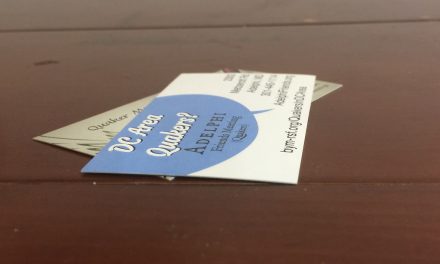Often, when we talk about the need to do outreach and invite people, Friends will say “I don’t believe in outreach. We should just keep letting our lives speak.”
However, I think we should examine deeply what we are doing that we believe qualifies as “letting our lives speak.”
Gearing up for a march every now and then and writing letters to our governments are lovely things to do. However, at a march you’re in a group of people who already agree with you; when you write a letter, only the recipient knows it.
Rather, what are we doing for the people around us? Are we bearing good fruit?
An example from Scripture
Jesus gave us many examples of letting our lives speak. His parable of the sheep and goats is the most list-like example I can think of.
“Then the King will say to those on his right, ‘Come, you who are blessed by my Father; take your inheritance, the kingdom prepared for you since the creation of the world. For I was hungry and you gave me something to eat, I was thirsty and you gave me something to drink, I was a stranger and you invited me in, I needed clothes and you clothed me, I was sick and you looked after me, I was in prison and you came to visit me.’
“Then the righteous will answer him, ‘Lord, when did we see you hungry and feed you, or thirsty and give you something to drink? When did we see you a stranger and invite you in, or needing clothes and clothe you? When did we see you sick or in prison and go to visit you?’
“The King will reply, ‘Truly I tell you, whatever you did for one of the least of these brothers and sisters of mine, you did for me.’
“Then he will say to those on his left, ‘Depart from me, you who are cursed, into the eternal fire prepared for the devil and his angels. For I was hungry and you gave me nothing to eat, I was thirsty and you gave me nothing to drink, I was a stranger and you did not invite me in, I needed clothes and you did not clothe me, I was sick and in prison and you did not look after me.”
“They also will answer, ‘Lord, when did we see you hungry or thirsty or a stranger or needing clothes or sick or in prison, and did not help you?’
“He will reply, ‘Truly I tell you, whatever you did not do for one of the least of these, you did not do for me.’
—Matthew 25:34-45 (NIV)
If you were to ask someone who lives near your meetinghouse, which category would they say your meeting is in? Does your meeting do or does it not do, in the eyes of your community?
This is certainly not to say things are only worth doing if they are seen. But they only count as letting our lives speak if they’re seen. They only do “double duty” as both good works and witness if they are seen.
Meeting community needs
Seeking to serve the local community is a great way of letting our lives speak, especially if visible.
I’ve heard of several churches who are primarily older folks that wanted to reach the younger families around them. They began by offering evenings where parents can drop off the kids. The kids get some “grandma time” with the older folks in the church. The parents get a date night.
Many communities need affordable/subsidized childcare. For children who have trouble in traditional schooling, a Friends school can be the answer, if there are scholarships in place.
There may be a need among recent immigrants for practice with the local language. Or perhaps a safe place to play could be provided by putting a swing set on the meetinghouse grounds.
Queries
– Do my meeting’s service efforts significantly include my local community?
– Does my meeting do work directly or does it only donate/pay others to do work?
– Do my meeting’s local service efforts directly operate on the local community’s needs? Have we asked our local community what they need?






Recent Comments